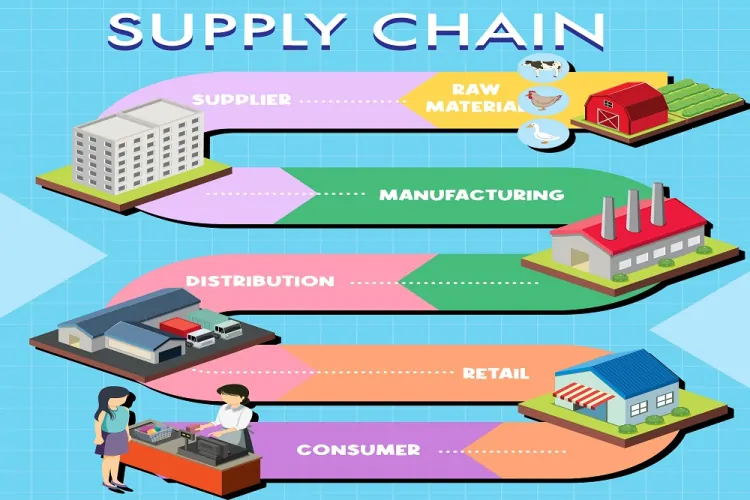8 essential features of supply chain management
In this article, we’ll explore the essential features that make supply chain management a crucial aspect of modern business operations.

Supply chain management is the backbone of every successful business. It ensures the seamless flow of goods, services, and information from suppliers to customers. By understanding and implementing the features of supply chain management, businesses can enhance efficiency, reduce costs, and meet customer demands effectively. In this article, we’ll explore the essential features that make supply chain management a crucial aspect of modern business operations.
The Building Blocks of Supply Chain Management
Supply chain management is more than just logistics; it’s a system that integrates planning, execution, and continuous improvement. The features of supply chain management serve as the foundation for creating a streamlined process that adapts to changes in the market. These features not only ensure operational efficiency but also drive customer satisfaction by delivering products and services on time. Understanding these elements is key to staying competitive in a fast-paced business environment.
8 Essential Features of Supply Chain Management
1. Strategic Planning and Design
Strategic planning and design are the cornerstones of effective supply chain management. By aligning supply chain strategies with overall business objectives, companies can optimize resources and minimize costs. Strategic planning involves determining the best routes, managing warehouse locations, and ensuring that supply meets demand. This feature helps businesses stay agile and responsive to market changes while maintaining profitability.
2. Advanced Forecasting and Demand Planning
Advanced forecasting and demand planning are critical features of supply chain management. Accurate forecasting allows businesses to anticipate customer needs and adjust their operations accordingly. This reduces the risk of overproduction or understocking, ensuring a balanced flow of goods. By leveraging historical data and market trends, companies can make informed decisions that minimize disruptions and improve customer satisfaction.
3. Inventory Management and Optimization
Effective inventory management is a vital aspect of supply chain management. Balancing supply and demand is essential to avoid overstocking or running out of stock. Proper inventory management ensures that products are available when needed, reducing holding costs and preventing delays. This feature of supply chain management is crucial for maintaining a steady flow of goods and meeting customer expectations.
4. Real-Time Data Visibility
Real-time data visibility is one of the most transformative features of supply chain management. It provides businesses with up-to-date information about inventory levels, shipment statuses, and market fluctuations. This transparency enhances decision-making, improves responsiveness, and reduces operational risks. With real-time insights, businesses can address issues promptly and maintain smooth operations across the supply chain.
5. Supplier Relationship Management
Building strong relationships with suppliers is an integral feature of supply chain management. A reliable supplier network ensures timely deliveries, consistent product quality, and cost-effectiveness. Effective supplier relationship management fosters collaboration, builds trust, and enables businesses to adapt quickly to changes in supply and demand. This feature is key to maintaining a resilient and efficient supply chain.
6. Technology Integration and Automation
Technology integration and automation are revolutionizing supply chain management. Tools such as artificial intelligence, the Internet of Things, and blockchain are streamlining operations, reducing human error, and enhancing efficiency. Automation simplifies repetitive tasks, while advanced technologies provide actionable insights. This feature of supply chain management enables businesses to optimize processes and stay ahead in a competitive market.
7. Risk Management and Contingency Planning
Risk management and contingency planning are essential for mitigating disruptions in the supply chain. Identifying potential risks, such as natural disasters, market fluctuations, or supplier failures, allows businesses to prepare proactive strategies. Contingency plans ensure continuity and minimize losses during unexpected events. This feature helps businesses maintain stability and adapt to challenges effectively.
8. Sustainability and Ethical Practices
Sustainability and ethical practices are becoming increasingly important in supply chain management. Consumers today prioritize companies that operate responsibly and minimize their environmental impact. Implementing eco-friendly practices, reducing carbon footprints, and ensuring fair labor practices are essential features of supply chain management. These efforts not only enhance brand reputation but also contribute to long-term success.
The Role of Technology in Enhancing Features of Supply Chain Management
Technology plays a vital role in modern supply chain management. Innovations like big data analytics, artificial intelligence, and blockchain are transforming traditional processes. Big data helps businesses analyze trends and improve forecasting accuracy, while AI automates decision-making and optimizes operations. Blockchain ensures transparency and traceability, reducing fraud and enhancing trust. By embracing technology, businesses can strengthen the features of supply chain management and achieve greater efficiency.
Conclusion
The features of supply chain management are essential for building a robust and efficient supply chain. From strategic planning and inventory management to technology integration and sustainability, these features ensure that businesses can adapt to market demands and overcome challenges. By focusing on these key elements, companies can improve customer satisfaction, reduce costs, and gain a competitive edge. As the business landscape evolves, understanding and implementing these features will remain critical for long-term success.
FAQs
1. What are the key features of supply chain management?
The key features include strategic planning, forecasting, inventory management, data visibility, supplier relationship management, technology integration, risk management, and sustainability.
2. How does real-time data visibility benefit supply chain management?
Real-time data visibility enhances decision-making, improves responsiveness, and reduces operational risks by providing up-to-date information about inventory and shipments.
3. Why is supplier relationship management important?
Strong supplier relationships ensure timely deliveries, consistent product quality, and adaptability to changes in supply and demand.
4. What role does technology play in supply chain management?
Technology streamlines processes reduces human error, and provides actionable insights, making supply chains more efficient and responsive.
5. How can businesses incorporate sustainability into supply chain management?
Businesses can adopt eco-friendly practices, reduce carbon footprints, and ensure ethical labor practices to create a sustainable supply chain.
What's Your Reaction?














